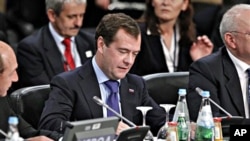At the recent NATO summit, the 28-member alliance agreed to end military operations in Afghanistan by 2014 if conditions are right. The leaders also agreed to a new mission statement. But many analysts say the meeting between NATO leaders and Russian President Dmitry Medvedev was the highlight of the Lisbon meeting.
Russia-NATO issues
The meeting between President Medvedev and NATO leaders was held in the context of the Russia-NATO council which brings together the 28 members of the Western alliance plus Russia. It was a parallel meeting to the official NATO summit and provided a venue to discuss issues important to both sides.
Missile defense
One of the key issues discussed was missile defense. The Bush administration proposed to deploy ground-based ballistic missile interceptors in Poland and a radar station in the Czech Republic. The Russians strongly opposed such a plan, saying it was aimed against Moscow, a view rejected by U.S. officials.
Ohio Wesleyan University NATO expert Sean Kay says the Obama administration proposed a more mobile, regional missile-defense system. And that system was approved by the NATO leaders.
"They have agreed in principle to begin the process of building an architecture for ballistic missile defense that would in theory cover all of Europe," Kay said. "I am not sure that's actually technically possible at this stage, but it is a significant victory diplomatically for the Obama administration. It is a major shift from the hard, heavy pressing for ballistic missile defense that the Bush administration pushed through and only got begrudging acceptance of that in the NATO alliance and of course, very much upset the Russians at the same time."
Missile defense cooperation
But in what many analysts say is a major shift, President Dmitry Medvedev has accepted a NATO invitation to cooperate on missile defense. Lowell Schwartz is a NATO and security expert with the RAND Corporation.
"Russia has been firmly in opposition," Schwartz said. "And this has been a major bone of contention, and the fact that Russia and the president (Medvedev) has agreed that Russia will certainly not stand in the way and would like to help and participate, is a very important milestone."
Promising shift
The head of the private research firm, the Arms Control Association, Daryl Kimball, says Moscow's shift is promising.
"But as you heard from the Russian officials, they still have a lot of questions about how this might work," said Kimball. "They want to make it clear that this should not simply be a defense for Western Europe and not European Russia. And there has been talk, we have to remember, for decades about potential cooperation between the United States and Russia on missile defense sharing technology, sharing early-warning radars, but that cooperation is going to be much more difficult to achieve when you get down to brass tacks and we will have to see how this develops."
On Afghanistan, Russia has agreed to facilitate and expand railway transit of non-lethal supplies from Europe to that country.
Daryl Kimball says this is part of the Obama administration's efforts to reset relations with Moscow.
"Russia's cooperation mainly has to do with helping NATO with its supply lines going into Afghanistan," Kimball added. "It means the United States does not have to depend solely on supply lines through Pakistan which is very important for NATO, gives it greater flexibility. And so I think that is another sign that the Obama administration approach with Russia is paying dividends in terms of tangible Russian cooperation on issues that matter to the United States and NATO."
But Sean Kay says Russia helping NATO in Afghanistan can be a double-edged sword.
"Because at the same time they can signal support for access to corridors, they are also sending the message that we also have the power to shut that down if things do not go our way," Kay said.
Support for START
Analysts say NATO leaders also provided a boost to President Barack Obama when they expressed support for the Strategic Arms Reduction Treaty between Washington and Moscow. The U.S. Senate is supposed to vote on whether to ratify the treaty, but the timeframe is uncertain.




